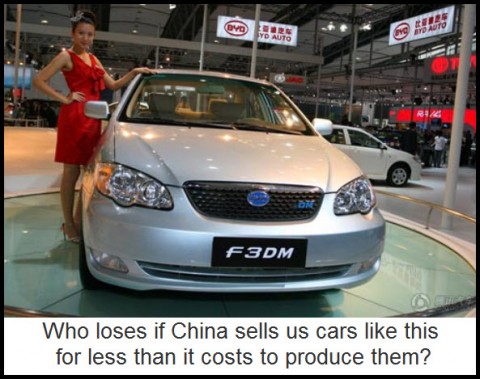Now comes a survey that says the American public has soured on free trade. This is one populist sentiment that few politicians have the guts to debate, let alone oppose. Under the circumstances, perhaps we were wrong when we wrote here the other day that a move in Congress to sock China with punitive new tariffs would fail simply because the destructive consequences of the Smoot-Hawley Tariff of 1930 are too well-known. Some have even argued that Smoot-Hawley, which raised tariffs on more than 20,000 imported goods to record levels, is what triggered the Great Depression. Whatever the case, economists in particular — even such as Alan Greenspan, who, on voluminous evidence, couldn’t pass an Econ-101 midterm exam — seem to understand that tariffs are generally a bad thing, at least in theory. Although tariffs are intended to level the playing field and keep the U.S. from getting flooded with cheap foreign goods, the risk is that they will provoke retaliation and, ultimately, a trade war that can devastate manufacturers on both sides of the Pacific.
From a purely economic viewpoint, one might ask what’s the harm if we let China sell us merchandise for less than it costs them to make it? Won’t that only benefit consumers? We pose these questions rhetorically, however, since there most surely is harm if the Chinese (for one) are deliberately underpricing goods in order to put our manufacturers out of business. Succeeding at this would give their exporters monopoly pricing power, meaning they could charge as much as the traffic will bear for the goods they sell us. Even so, we risk having our own manufacturers grow less competitive, and ultimately obsolete, if tariffs are too high. Ideally, they should be just high enough to give domestic manufacturers some breathing room while they try to become more efficient and, eventually, more competitive.
A Desire to Punish
The problem is that tariffs are rarely set “just high enough;” for levies are in fact determined more by politics than economics, and they are therefore punitive by design. Moreover, the current push to raise tariffs against China comes not from a desire to restrain supposedly unfair trade in certain specific goods, but to goad China into allowing the yuan to float higher. That would have an effect similar to placing a tariff on all of the country’s exports, since a rise in the yuan relative to the U.S. dollar would reduce China’s competitiveness across-the-board. That’s asking a lot, since the U.S. and nearly every other country in the world have been doing everything in their power to cheapen their own currencies. Ultimately, there is no economic advantage in this for any of the players – only the promise of an inflation that raises prices globally by perhaps hundreds of billions of dollars without creating even a dime’s worth of real wealth.
(If you’d like to have Rick’s Picks commentary delivered free each day to your e-mail box, click here.)


Oh, and to the general topic of Tariffs…
Tariff’s may serve to adjust prices of Chinese Goods to US labor and income standards, but the net result of this in a declining dollar environment is just further erosion of the dollar’s purchasing power at home as well as abroad… not exactly the intended outcome, I’d assume.
Look, US manufacturing is not ramping back up for a number of reasons, and currency and labor exchange rates is only one of them. Some of the other reasons include lack of interest in borrowing by those who attempt to treat credit as capital for new business development (the riskiest poker game on Earth), and lack of capital deployment by those fortunate enough to have a real capital base accumulated.
If you had a Billion dollars to go start a new venture, would you do it in the current US regulatory environment…?
Neither would I.